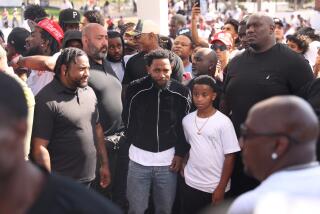Compton Comes Down Hard on Eazy-E : Image: Mayor denies the rap singer permission to make a video in the city, saying it will only be detrimental to the community.
- Share via
Rapper Eazy-E came to Compton on Tuesday night hoping to get permission to shoot a new video in his hometown. Instead, he got a 90-minute dressing-down from the mayor and City Council members who say he has spread negative images of the city and used derogatory language in describing women and blacks.
Eazy-E, whose real name is Eric Wright, was denied an initial request to film in the city last week after Police Chief Hourie Taylor said the project would be detrimental to the city.
Wright--originally of the group N.W.A., whose 1989 album “Straight Outta Compton” popularized the term “gangsta rap”--asked the council Tuesday to overturn the chief’s decision. He spoke along with his lawyer and video director.
But Mayor Omar Bradley angrily denied the request, saying he was tired of rap stars demeaning the city.
“Even if you didn’t have anything to do with a lot of the other videos,” Bradley told Wright’s director, Marty Thomas, “the effect is that when the mayor of Compton goes to New York, he’s a joke. He’s a joke because they think the city is full of animals.”
And then turning angrily to Wright, who was sitting in the audience, Bradley said: “And you don’t even have the courtesy to hire black people to direct or orchestrate this film.” He referred to Thomas, who is white.
Wright and fellow songwriter Andre Wicker--also known as Gangsta Dresta--went to the speaker’s podium to defend themselves but did not persuade the council of their good intentions.
“Beloved brother,” Bradley began, before they could even speak. “I just feel like someone has tricked you into using your talents for wrong. Do you think this (rap video) is going to benefit the young brothers? Tell me, from the bottom of your heart.”
Wright then questioned whether the mayor and council really listened to his music or understood it. Rap music could actually encourage youngsters to get off the street and into the entertainment business, said Wright, who was born and raised in Compton.
But Bradley countered, saying that rap only glorifies criminals.
Tempers flared anew when a preliminary description of the video project--in which derogatory terms for blacks and women were used--was handed to council members. Wicker attempted to defend the language, saying, “That’s just the way we talk.”
Bradley told him he was being deceived into betraying blacks with negative stereotypes.
“I won’t name the specific racial group that’s using you, brother, but they are destroying us and having a lunch and a bar mitzvah at the same time,” Bradley shouted. “And we know from history that the minute they get finished making money off of you, you’ll be sitting beside Mike Tyson” in prison.
Wright and Wicker defended their video project, saying it reflected the reality in the streets.
“Basically what they said is (that) I made Compton look bad,” said Wright, whose last solo album, “Eazy Does It,” sold 3 million copies. “I didn’t. I put Compton on the map.”
Wicker added a personal note.
“It makes me feel bad that the city I came from won’t let me come back and film my first project here,” he said. “What we’re showing may not be your reality, but it’s ours.”
In the end, Bradley offered to meet with Wright, Wicker and Thomas in an effort to ensure that Compton is portrayed positively.
“If you can do a video putting Compton in the proper light, we will all star in it if necessary,” Bradley said, referring to himself and council members.
More to Read
The biggest entertainment stories
Get our big stories about Hollywood, film, television, music, arts, culture and more right in your inbox as soon as they publish.
You may occasionally receive promotional content from the Los Angeles Times.






